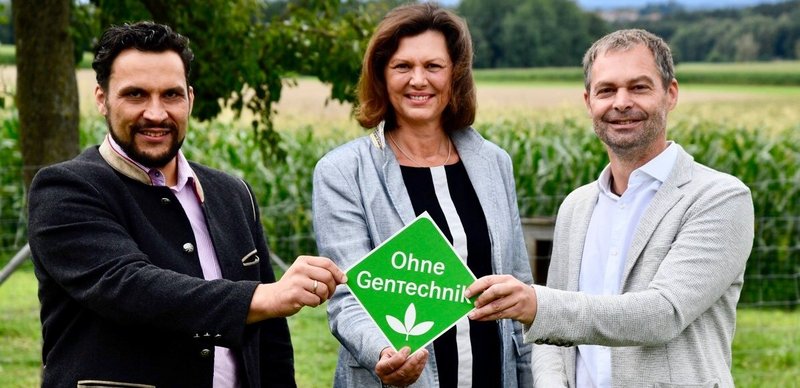News
Majority of Germans prefer “Ohne Gentechnik” label on foods
71 percent rate the use of genetically modified plants as feed for animals used for milk, eggs and meat as negative. That was the result of a current representative survey by the opinion research company Civey on behalf of Verband Lebensmittel ohne Gentechnik (VLOG). Today in Wasserburg am Inn Ilse Aigner, President of the Bavarian State Parliament and former Federal Minister for Food, Agriculture and Consumer Protection, together with Florian Bauer, managing director of the holding company J. Bauer, which also includes the well-known Privatmolkerei Bauer, and Christoph Zimmer, a member of the VLOG management board, presented the results of the survey. Time to take stock: Ten years ago, on 10 August 2009, the “Ohne Gentechnik” seal was introduced in Germany by the then federal minister, Ilse Aigner.
By now 14,000 foods in Germany carry this label. Among them are some 5,400 dairy products, 4,100 poultry products and almost 2,200 egg products. In 2018 products with the “Ohne Gentechnik” seal posted total annual sales of EUR 7.7 billion. VLOG experts are anticipating sales of EUR 8.5 billion in 2019. On behalf of the federal government VLOG awards appropriately manufactured foods the license for the uniform “Ohne Gentechnik” seal. One of the first users of the seal was Privatmolkerei Bauer in Wasserburg am Inn. “To me, the broad consensus in favour of the ‘Ohne GenTechnik’ seal is a success story,” stresses Florian Bauer, managing director of the holding company J. Bauer GmbH & Co. KG. “Here Germany issued clear rules for labelling. It’s about time to implement this in the EU as well.” And Christoph Zimmer adds: “An increase of 41 percent in the ‘Ohne Gentechnik’ food market in one year sends a clear message. Politics has the obligation to create reliable framework conditions so that the food industry can continue to serve such booming markets.”
Filling in information gaps with the ‘Ohne Gentechnik’ label
“With the ‘Ohne Gentechnik’ label we filled in a large information gap for consumers in 2019,” says Ilse Aigner. “For me it has always been about transparency for consumers, so that they can decide for themselves. And of course this goes for feed as well.” At the end of last year Ilse Aigner emphasized freedom of choice for consumers and noted that this must also apply to products that are manufactured with the new genetic engineering methods.
Products of the new genetic engineering to be regulated, too!
The current Federal Minister of Food and Agriculture, Julia Klöckner, apparently sees things differently. According to VLOG she is campaigning to change EU genetic engineering law so that it does not cover products of so-called new genetic engineering. This includes the CRISPR/Cas technology, which has become known as ‘gene scissors’. This is a molecular biology method to make targeted cuts and changes to DNA. “Federal Agriculture Minister Klöckner must no longer be allowed to dance to the tune of the genetic engineering lobby! She must listen to the consumers who, day after day, make purchasing decisions that clearly express their desire for GMO-free products,” says VLOG board member Christoph Zimmer. “Products made using the new genetic engineering must also be tested and labelled in accordance with genetic engineering law. The lofty good of the precautionary principle must be maintained.”
This view is shared by consumer protection activists. “The ‘Ohne GenTechnik’ seal gives consumers power – the power to decide with each purchase whether to promote the cultivation of genetically unmodified plants or not. This freedom of choice must be maintained, including for products that were produced with new genetic engineering methods,” demands Anne Markwardt of the Verbraucherzentrale Bundesverband, where she heads the Food Team in the Consumer Policy Division.
Still large gaps in EU genetic engineering labelling
On behalf of VLOG the opinion research company Civey surveyed a total of 2,500 persons over the age of 18. 82 percent want to see transparency about whether food, eggs and meat were manufactured with genetically modified plants in the animal feed. While the use of genetically engineered plants in food must be declared in the European Union, the animal-based food manufactured with these despite the negative attitude of the population does not bear any reference to genetic engineering. That means that consumers cannot recognise whether products such as milk, meat or eggs come from animals fed with genetically modified feed. In the EU most commercially available compound feed contains genetically modified soy meal. That way the genetically engineered plants find their way unnoticed onto the supermarket shelves. And thus the consumers, against their will, are co-opted as proponents of something they themselves see as harmful to the environment – the cultivation of genetically modified plants.
A majority of Germans prefer ‘Ohne Gentechnik’ label on food

